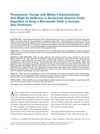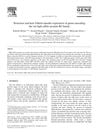 January 2014 in “American Journal of Medicine and Medical Sciences”
January 2014 in “American Journal of Medicine and Medical Sciences” Minoxidil, originally a blood pressure medication, is effective in treating hair loss in men and women, with different strengths recommended for each.
AGA is caused by genetics and androgens, treatable with finasteride and minoxidil.
 7 citations,
April 2020 in “Dermatologic Therapy”
7 citations,
April 2020 in “Dermatologic Therapy” Dexpanthenol improves hair growth in male baldness.
 29 citations,
September 2012 in “Dermatologic Clinics”
29 citations,
September 2012 in “Dermatologic Clinics” Hair disorders are caused by a complex mix of biology, genetics, hormones, and environmental factors, affecting hair growth and leading to conditions like alopecia.
 27 citations,
May 2010 in “Dermatologic surgery”
27 citations,
May 2010 in “Dermatologic surgery” Photodynamic therapy with methyl 5-aminolevulinic acid is ineffective for treating alopecia totalis.
 2 citations,
December 2023 in “Royal Society of Chemistry eBooks”
2 citations,
December 2023 in “Royal Society of Chemistry eBooks” Hair is a complex organ, and understanding its detailed structure and growth phases is crucial for analyzing substances within it.
November 2021 in “CRC Press eBooks” Hair color is determined by melanin and can be affected by genetic conditions like albinism.
107 citations,
June 1997 in “PubMed” EGFR is essential for normal hair development and follicle differentiation.
December 2023 in “Animals” The study mapped yak skin cells to understand hair growth better.
 1 citations,
April 2024 in “Journal of Autoimmunity”
1 citations,
April 2024 in “Journal of Autoimmunity” Interleukin-15 can help hair growth and protect hair follicles.
 85 citations,
April 2007 in “Dermatologic Clinics”
85 citations,
April 2007 in “Dermatologic Clinics” Some drugs can cause hair loss, change hair color and shape, or increase hair growth, and treatment may involve stopping the drug or using specific hair growth treatments.
28 citations,
August 2006 in “The journal of investigative dermatology/Journal of investigative dermatology” Survivin protein is crucial for hair growth and preventing cell death in hair follicles.
3 citations,
December 2017 in “Clinical and Experimental Dermatology” Reversible hair loss in a ring pattern on the scalp may be linked to changes in leptin levels in fat tissue.
 18 citations,
January 1998 in “Endocrine”
18 citations,
January 1998 in “Endocrine” RU58841, a nonsteroidal anti-androgen, showed potential as a topical treatment for hair loss, increasing hair density, thickness, and length without systemic side effects in Stumptailed Macaques.
 4 citations,
September 2020 in “Annals of Translational Medicine”
4 citations,
September 2020 in “Annals of Translational Medicine” Concentrated nanofat helps mice grow hair by activating skin cells and may be used to treat hair loss.
 69 citations,
April 2010 in “Dermatologic Surgery”
69 citations,
April 2010 in “Dermatologic Surgery” Bimatoprost is a safe and effective treatment for making eyelashes longer, thicker, and darker.
 192 citations,
March 1998 in “British Journal of Dermatology”
192 citations,
March 1998 in “British Journal of Dermatology” Minoxidil boosts growth factor in hair cells, potentially promoting hair growth.
14 citations,
October 2002 in “Journal of cutaneous pathology” MAP-2 is crucial for the structure of hair follicles and nails.
 12 citations,
February 1998 in “Gene”
12 citations,
February 1998 in “Gene” The B2 genes are crucial for hair growth in rats.
92 citations,
September 2013 in “Journal of Investigative Dermatology” BMAL1 and Period1 genes can influence human hair growth.
 46 citations,
January 1991 in “Journal of Investigative Dermatology”
46 citations,
January 1991 in “Journal of Investigative Dermatology” Minoxidil works in liver and outer hair root sheath for hair growth.
 12 citations,
May 2018 in “JAAD Case Reports”
12 citations,
May 2018 in “JAAD Case Reports” A man's gray hair got darker and thicker after using a psoriasis drug.
 October 2024 in “International Journal of Molecular Sciences”
October 2024 in “International Journal of Molecular Sciences” Rosa rugosa extract promotes hair growth and could be a natural treatment for hair loss.
 53 citations,
May 1990 in “Journal of Dermatology”
53 citations,
May 1990 in “Journal of Dermatology” Minoxidil speeds up hair growth in rats without prolonging growth phase.
 April 2023 in “Journal of Investigative Dermatology”
April 2023 in “Journal of Investigative Dermatology” Melatonin may help prevent hair loss caused by the chemotherapy drug paclitaxel.
12 citations,
September 1999 in “The journal of experimental zoology/Journal of experimental zoology” Prolactin levels do not control the start of winter fur growth in mink.
35 citations,
December 2014 in “Lasers in surgery and medicine” Red light promotes hair growth by directly stimulating hair cells and improving cell communication.
 1 citations,
April 2024 in “Journal of Pharmaceutical and Pharmacological Sciences”
1 citations,
April 2024 in “Journal of Pharmaceutical and Pharmacological Sciences” The mouse models are effective for testing new hair loss treatments.
 June 2011 in “Journal of clinical and experimental investigations”
June 2011 in “Journal of clinical and experimental investigations” Oral zinc sulphate is an effective and safe treatment for thallium poisoning.

Ganoderma lucidum extract may help treat stress-related hair loss.



















